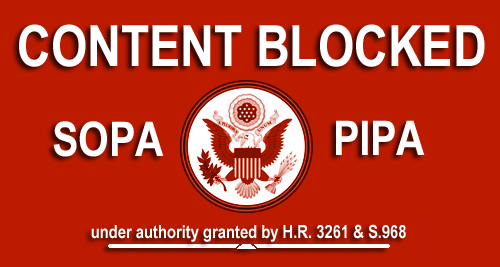Today marks the one-year anniversary of the SOPA/PIPA proposed legislation, which had the potential to completely change the nature of the internet. On this first “Internet Freedom Day” what do the authors of the legislation have to say about the future of the open web?
Last year, a massive online protest against the proposed legislation basically killed it before it even went to a vote. It would have been political suicide for any politicians to vote in favor of the controversial laws after Google, Wikipedia, Craigslist, Reddit, and a host of other sites went dark to demonstrate what is at stake with laws like SOPA and PIPA.
A timely article from news.cnet.com interviews the creators of the unpopular laws to ask what’s next in the area of online copyright protection. Opponents of SOPA and PIPA have suggested counter legislation with the purpose of expanding Internet freedom and curbing what they call “copyright abuses”.
It seems that many politicians are a little gun-shy when it comes to any legislation related to tech. These politicians are afraid of the seemingly career-killing move because of the massive public outcry last year. Estimates put the number of individuals that participated in the online protest at 10 million, and allthingsd.com puts the number of participating websites at 100,000.
There are grumblings in Washington about a possible resurrection of SOPA-esque “Internet Piracy” legislation that President Obama himself has weighed in. It’s also clear that Hollywood lobbyists and others with a vested interest in strong copyright laws are willing to spend the time and the money to keep legislation like this moving through Congress.
In a nutshell, the future of internet piracy laws weighs on the shoulders of the House and Senate. They will balance the political fallout of pushing through unpopular legislation with the financial weight of not doing so. In the meanyime, the internet will keep its fingers crossed that the legislation rests in peace.


